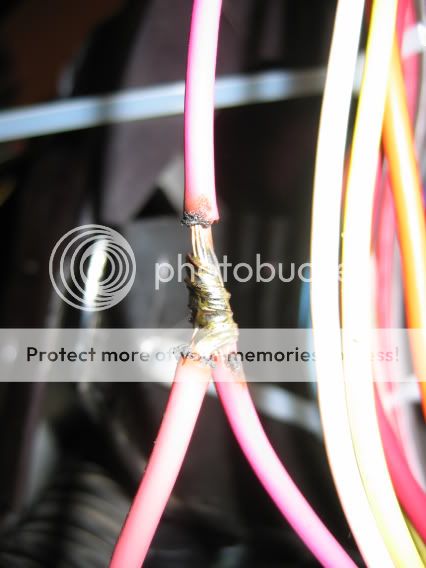Soldering heavy gauge wire
Printed From: the12volt.com
Forum Name: Car Security and Convenience
Forum Discription: Car Alarms, Keyless Entries, Remote Starters, Immobilizer Bypasses, Sensors, Door Locks, Window Modules, Heated Mirrors, Heated Seats, etc.
URL: https://www.the12volt.com/installbay/forum_posts.asp?tid=73610
Printed Date: December 25, 2025 at 8:37 AM
Topic: Soldering heavy gauge wire
Posted By: 1998chevy1500
Subject: Soldering heavy gauge wire
Date Posted: February 27, 2006 at 6:31 PM
I just finished installing a remote start in my truck, soldering all of the joints for a good connection. However my soldering iron just didn't have the power to properly melt the solder into the joints on the ignition wires, it just kind of blobed the solder on top of the joint. To fix it I took a little pocket torch lighter that puts out a nice little hot blue flame and heated the joint with it. It seemed to work nicely, after heating the joint for about 15 seconds the solder started to liquify and wick into the connection. What I am wondering about is the excess amount of the rosin (I blieve thats what its called) that appeared on the surface of the joint. I don't know if thats a bad thing, or what exactly even caused it. I know the joint lookes a lot better this way than with the solder melted on top of the joint, but the excessive amount of buildup on the surface of the joint has me a little concerned. Oh, and for "heat shielding" I also used an old CD that I found on the floor so that I didn't melt any of the other wires in the process.
So after all that what I really want to know is this something that I should be concerend about or something that is somewhat natural when soldering larger gauge wire properly?
Here are the pictures, sorry about them being a little blurry.


Thankx
Conrad
P.S. Not that it really matters but it was in a 1998 Chevy K1500, but the rules do say list the year and model.
Replies:
Posted By: genehewett
Date Posted: February 27, 2006 at 7:36 PM
That is what its suspose to do. This is to protect the connection from contaminants that are in the air.
Posted By: 1998chevy1500
Date Posted: February 27, 2006 at 9:04 PM
Good to know. I've seen a little bit of it form on the surface of joints before, but just never this much.
Thankx
Conrad
Posted By: kohara73
Date Posted: February 27, 2006 at 9:07 PM
Those little pocket torches are the BEST. I do every install with one.
-------------
Keith
Posted By: bazzgazm
Date Posted: February 27, 2006 at 9:16 PM
That gold would be the sign of a cold solder joint=)
Tips for next time.
1: Invest in a set of garder and bender automatic strippers(great up to 10 gauge) 14.99
2: Invest in a simple weller 120v (100/140w) soldering gun. (24.99)
3: strip the wire back, Poke a hole in the center, wrap tight, Then solder.
Not criticizing your work, Consider this some free knowledge from someone with way too many remote starts.
otherwise, At least you soldered
Posted By: dualsport
Date Posted: February 27, 2006 at 10:25 PM
Yeah, soldering gun is the thing to use for that type of soldering. An open flame overheats and oxidizes the wires, so it's not the best way to go-
Posted By: 1998chevy1500
Date Posted: February 27, 2006 at 11:19 PM
Cold solder joint, nuts I thought I was preventing that by actually heating the joint so that the solder wicked into the wires instead of sitting on the surface.
100/140W is what you need for heavy gauge wire, that definatly explains why my measly little 30W Radio Shack special soldering iron didn't have what it took to heat the joint. If sometime in the future I happen to do another install I will definatly invest in a soldering gun. Also if I were to tear back into the dash and reheat these joints with the gun would I be able to fix the cold solder problem? Is there a time frame before the solder can't be properly reheated?
I did do the strip the wire back, poke hole, wrap tight solder with a slight variation. I only poked about half of the wire through the center while the other half remained on the outside and then wrapped them around the wire in opposite directions. The reason for this was I was having trouble getting the wire to wrap tight if I kept it all together. Not really sure if my description of what I did is all that good.
Thank you for passing on the knowledge I am always up for learning something new. I have progressed a long way from the first remote start that I put in this truck 2 years ago where I mounted the brain to the fire wall right under the carpet(a rediculuously obvous spot espically with the rats nest of non factory looking wires that I had running to it) and made all my connections with dare I even say Scotch locks/quick connects  . So I feel that I have come a long way in the 2 years that have passed, but I still have a lot to learn.
Thankx for the help every one
Conrad
Posted By: dualsport
Date Posted: February 27, 2006 at 11:57 PM
I wouldn't worry much about that joint, it looks okay. It's just easier working with a soldering gun than waving a torch on the joint just right to avoid overheating it and burning off the flux. If you get a soldering gun, Weller's a good brand to get- dual stage heating is good because it heats up so quickly, you just pulse it on and off to regulate it.
Posted By: amcmac
Date Posted: February 28, 2006 at 4:48 AM
What do you guys mean when you say poke a hole in the wire after your strip it. Do you poke a hole in the wire you are tapping into and then feed the stripped end of the alarm/RS wire into the hole, wrap it tight, and solder it? Sorry for the ignorance.
Posted By: mrcllusb
Date Posted: February 28, 2006 at 5:12 AM
First you strip about an inch off of the wire your tapping into.Take the probe from your multimeter and poke a hole into the exposed wire.Feed the stripped wire that comes from your alarm/rs thru the hole.Wrap the wire around one side,then the other,then around itself.Then you can solder it,or just tape it real tight with an installers best friend (3M),then zip tie the wires to each other..If you need to see exactly what i mean pm me your e-mail address and i'll send you the printout..
-------------
"ole blake"
Posted By: 1998chevy1500
Date Posted: February 28, 2006 at 9:01 AM
What mrcllusb said, except that I use a straight pick from a hook and pick set as it is a lot sturdier and cheaper than a DMM probe.
Posted By: thepencil
Date Posted: February 28, 2006 at 9:48 AM
If I can add something to this is that better tools will give you better results. If you have not use a high temperature soldering tool before do try to use it just once. You will find the difference quite noticable. If you are a DIY, borrow one on for the weekend and return it Monday. This is the type of power that everyone should be using if you want better result. 260 Watt. Anything less power the job kinda get messy. Soldering gun.
Also, if you are going to loop the wire through. Don't worry about soldering. The tape will hold out. Trust me on this.  Do one or the other, but don't do both. You are just wasting time! If you are going to loop the wire through, do a good job taping up the wire. If you are going to solder the wire together do a good job soldering the wires together. ------------- Be careful whose advice you buy, but be patient with those who supply it. 
Posted By: Velocity Motors
Date Posted: February 28, 2006 at 10:18 AM
Personally I love my cordless butane soldering iron. Heats up within 15 seconds and stays hot throughout my installation. They are a bit pricey but well worth the extra $$ when you consider no wires, no wait time and if maintained, the tips will last you years ( or months if you do alot of soldering ).  WST2PyroPen Butane Mini Hot Air & Soldering Iron------------- Jeff
Velocity Custom Home Theater
Mobile Audio/Video Specialist
Morden, Manitoba CANADA
Posted By: 5150azn
Date Posted: February 28, 2006 at 11:01 AM
Damn Velocity! Thats a cool looking one!!!
I have the snap-on one... costs a freak'in fortune.
-------------
Tell the Snap-On guy I'm not here!
Posted By: bazzgazm
Date Posted: February 28, 2006 at 2:03 PM
I'm just throwing my last 2 cents in here. But if you work for someone Other than yourself you might wanna make sure regardless of looped, or not.. that you solder your wires=) Specially sensitive wires like tach, Now, I will add. I looped, and tape wrapped my friends cavalier rs/keyless/alarm =) hit a barrier on the interstate at god knows how fast (no more than 110 though. stupid governer) anyway... the car was in shambles. but the keyless still worked. and if the engine wasn't pushed up into the cab a few inches, i bet it woulda still remote started too.
Posted By: bryan grzonka
Date Posted: March 03, 2006 at 9:35 PM
Are the t-tab type quick connectors bad?
Posted By: Ravendarat
Date Posted: March 03, 2006 at 10:55 PM
T-TAPS ARE NOT TO BE USED FOR ANYTHING. They are complete trash, they generally damage wires and for the guys that say they use them in tight places where they cant solder, Im 6' 2" and about 280lbs and have never found a place I couldnt solder. Ask kgerry, he's seen me before :). T-taps are whats used by guys in their backyards who are doing installs at -20 or by guys who either wernt told better or were told and figured they knew best.
-------------
double-secret reverse-osmosis speaker-cone-induced high-level interference distortion, Its a killer
|


 . So I feel that I have come a long way in the 2 years that have passed, but I still have a lot to learn.
. So I feel that I have come a long way in the 2 years that have passed, but I still have a lot to learn.
 Do one or the other, but don't do both. You are just wasting time! If you are going to loop the wire through, do a good job taping up the wire. If you are going to solder the wire together do a good job soldering the wires together.
Do one or the other, but don't do both. You are just wasting time! If you are going to loop the wire through, do a good job taping up the wire. If you are going to solder the wire together do a good job soldering the wires together. 